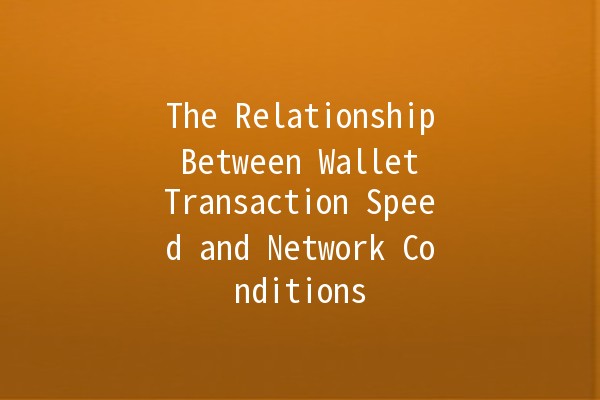
In the digital age, the speed of financial transactions plays a crucial role in how seamless our online experiences are. One of the rising stars in the world of finance is the cryptocurrency wallet, but users often overlook a critical factor affecting their experience: network conditions. The efficiency of a wallet transaction is not only dependent on the wallet itself but is significantly influenced by the current state of the network through which the transaction is processed.
Understanding Wallet Transactions
A wallet is a software application that enables users to store and manage their digital assets, such as cryptocurrencies. When a transaction occurs, it is submitted to a blockchain network, where it waits to be confirmed by miners or validators. This process can take anywhere from seconds to minutes, or even longer, depending on various factors. Let’s delve deeper into the elements influencing wallet transaction speed.
Key Factors Affecting Transaction Speed

Enhancing Transaction Speed: Practical Tips
To improve the speed of your wallet transactions, there are several strategies and productivity tips you can employ:
Explanation: Monitor network conditions to identify offpeak times when fewer transactions are being processed.
Application: Many blockchain networks experience peak usage at specific times (for instance, during major news events affecting cryptocurrencies). Using tools like blockchain explorers can help you visualize network congestion in realtime.
Explanation: Understand the fee structure of the network you’re transacting on and adjust your fees accordingly.
Application: Tools like fee estimators can suggest competitive fees based on current network activity. By setting a higher fee during busy times, you can ensure your transaction is prioritized.
Explanation: Select a wallet known for its efficiency and speed in processing transactions.
Application: Research wallets with positive reviews regarding transaction speeds. Look for those that frequently update their applications to adhere to the latest protocol changes and optimizations.
Explanation: Ensure a stable and fast internet connection to reduce the chances of transaction delays.
Application: Always use a reliable connection, preferably wired, when initiating transactions. Consider upgrading your internet service if you frequently experience slow speeds.
Explanation: Keep informed about updates and changes to the blockchain network that might affect transaction speeds.
Application: Follow reputable news sources and community forums. Being aware of upcoming upgrades or issues can help you time your transactions effectively.
Common Questions Regarding Wallet Transaction Speed
The average time varies widely depending on the blockchain. For Bitcoin, confirmation can take anywhere from 10 minutes to several hours, while Ethereum transactions can be confirmed in about 15 seconds to a few minutes based on network activity.
Choosing a higher fee incentivizes miners to prioritize your transaction in the next block they mine, as higher fees increase their earnings. This is particularly important during periods of high demanded transactions when many users are competing for space in the limited block size.
While weather does not directly affect the blockchain's transaction speed, severe weather can lead to internet outages or disruptions in power supply that may impact a user's ability to send or receive transactions.
Yes, it's advisable to wait for at least one confirmation (possibly more for highvalue transactions) before spending funds, as this ensures that the transaction is successfully recorded on the blockchain. The more confirmations, the more secure the transaction.
Several factors can contribute to a pending transaction: low transaction fees, high network congestion, or issues with your wallet provider. Ultimately, patience may be required during peak times, but you can always check your transaction's status through a blockchain explorer.
If a transaction fails, first check your wallet app for error messages. If issues persist, consider retrying the transaction with a higher fee or at a different time. It's essential to ensure your internet is stable before retrying.
al Note
Understanding the relationship between wallet transaction speed and network conditions is crucial for anyone involved in cryptocurrency transactions. By implementing the strategies outlined above and remaining informed about network dynamics, users can navigate the often hectic world of digital wallets more effectively, ensuring that their transactions are executed swiftly and safely. Let's embrace this knowledge to make every transaction count in the fastpaced world of cryptocurrencies!

